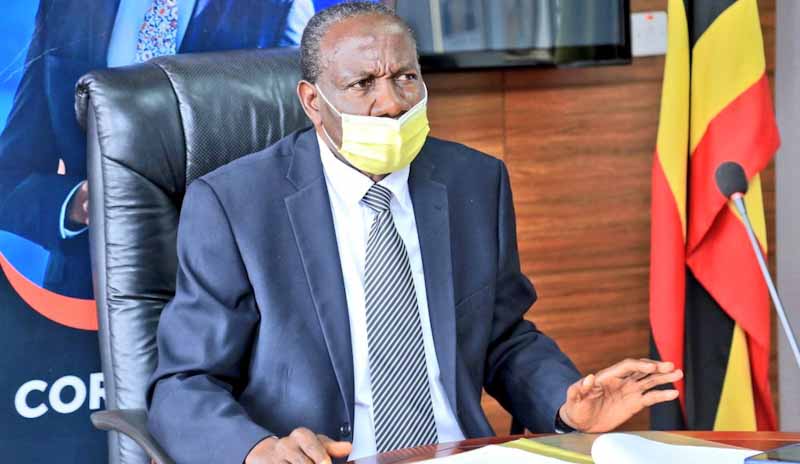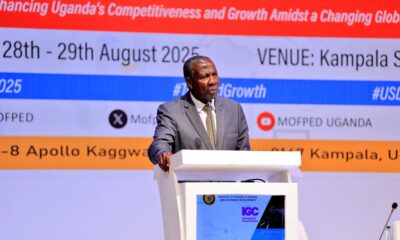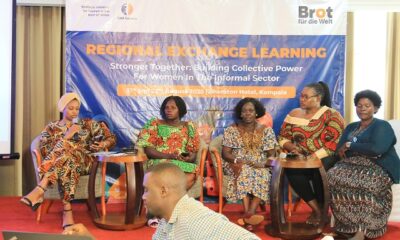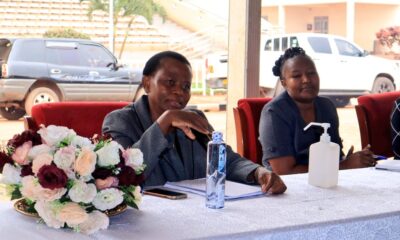Business
What to expect as BoU takes control of Telecos?

Finance Minister Kasaija
Last month, the Bank of Uganda (BOU) started implementing the National Payments System Act 2020 and the National Payments Systems Regulations for Sandboxes.
This implies that Mobile Money services have now been completely detached from the regulation of the Uganda Communications Commission to that of the Bank of Uganda (BOU), amidst questions and fears from the customers.
In this three companies have so far been licensed to conduct mobile money services under the new regulations, which also provided for the separation of mobile money and telecommunication services into different companies for regulatory purposes.
Consequently, Airtel Mobile Commerce Uganda Ltd and MTN Mobile Money Uganda Ltd were the new companies formed and licensed for mobile money services, along with M/s Wave Transfer Limited that got approval to operate under the Regulatory Sandbox Framework.
Other companies that have applied for the license include Uganda Telecom, Africel, Mcash, Ezee Money and Interswitch.
Airtel Uganda completed the separation process mid-June, technically transferring Airtel Money Business to Airtel’s affiliate, Airtel Mobile Commerce Uganda Limited (AMC Uganda).
As a result, AMC will now conduct all Airtel Money Services in partnership with and through Airtel Uganda, while the service model to the customer remains unchanged as according to Manoj Murali, the Airtel Uganda Managing Director.
“Nothing changes from a customer perspective. Going forward, our affiliate company, Airtel Mobile Commerce Uganda Ltd under supervision and regulation of Bank of Uganda will provide Airtel Money Services to the registered Subscribers of Airtel Uganda Ltd, on the same terms and conditions,” he said.
The main concerns from the public about the changes include the safety of their money, the high costs of operations and the quality of service. This also includes the cost of saving, depositing, transferring and withdrawing cash.
The company head however says that as a result of the separation, Airtel Money will maintain the same level of safety and protection, and in compliance with the privacy and data protection laws of Uganda and the directives of Bank of Uganda and Uganda Communications Commission.
“The customer deposits are safe, secure and kept in reputable commercial banks with the same level of protection as other bank accounts. AMC Uganda and the Commercial Banks holding the customers’ funds are licensed, regulated and supervised by the Bank of Uganda,” says Manoj.
Under the old system, saving on the mobile money platforms has been free and attracted no interest, but now, the companies are expected to offer interest to encourage customers see them as a complete financial support service. In this, Customers will be allowed to save up to the maximum amount that is allowed for cash transfer, while the minimum savings is UGX 500 for Airtel.
“When you save with Airtel Money Super Saver, you get 5 percent annual interest on savings which can be prorated weekly. Note that you can save as much as up to the current Airtel money transaction limit,” Manoj said.
On their part, when asked, the MTN Senior Manager Communications and Stakeholder Management Rhona Arinaitwe, said they do not expect to make any changes regarding the customer experiences.
“There is no impact on the customer from the separation, our customers continue to enjoy our mobile money services seamlessly,” said Arinaitwe.
Airtel and MTN have a combined subscriber base of mobile money users of about 20 million, out of a total of 24 million users.
According to Uganda Communications Commission, the total value of all mobile money transactions by all platforms reached USD 8.2 billion (UGX 30 trillion) in the fourth quarter of 2020, up by over one billion U.S. dollars compared to the previous quarter when the total transaction value amounted to USD6.97 billion (UGX 25 trillion).
As far as the pricing of the products, including the loans, savings and withdrawals, Charity Mugumya, the Bank of Uganda (BOU) Director Communications says the companies will operate under the business laws and policies of the country, which operates a liberalized market economy.
“Uganda runs a liberalized interest rate regime in which lending rates are market determined. Given the different cost structures of the lenders, varied risk profiles of the borrowers, and the varying collateral arrangements, the interest rates cannot be expected to be the same across the different players in the financial sector,” she says.
She however says that saving on the mobile money account, will have to attract some interest, according to the provisions, under Section 49 (6) of the NPS Act, 2020 and Regulation 14 of the NPS Regulations, 2021 that provides for interest to be paid to e-value account holders.
“Going forward, holders of “mobile money” accounts will earn interest on their accounts,” says Mugumya
Comments



























